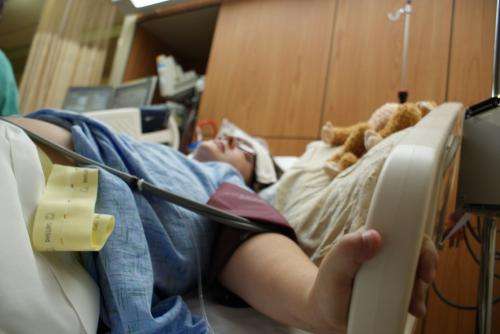Blood test distinguishes premature births from 'false alarms'

Women who give spontaneous preterm birth have specific genetic signatures which doctors can now detect with a simple blood test.
Women and Infants Research Foundation Associate Professor Craig Pennell says early contractions are the main reason why women are admitted to hospital but only five per cent will go on to deliver their babies early.
The extended hospitalisation exposes them to unnecessary psychological stress and medical intervention while putting unnecessary pressure on the health system.
However research co-authored by Prof Pennell and published in Plos One uses microarrays to investigate the genes expressed in white blood cells, identifying nine that performed well as a predictive test for spontaneous premature delivery.
The test used blood from 150 women who were admitted to King Edward Memorial Hospital of which 48 gave birth within 48 hours.
Prof Pennell says the test showed gene activation in pathways related to immune system processes, and inflammatory and biological stress pathways.
"What we are looking at is what is being turned on and off in white blood cells and what is causing labour related to the myometrium, to the uterine muscle, and foetal membrane and these sorts of things," Prof Pennell says.
"We can't sample the myometrium of a women in labour or who comes in contracting or is asymptomatic, but we can collect blood so we were looking for a distant marker.
Cellular pathways for better understanding preterm birth
"The interesting thing is the genes that we have shown to increase or decrease when we look at the pathways are the same eight or nine that over-expressed or under-expressed and the vast majority of those pathways fit with existing biological knowledge.
"Because we have identified these new pathways and new genes where there are expression differences, it may that some of these pathways or some of these genes have proteins that can be blocked."
It is estimated eight per cent of babies born in WA are delivered prematurely.
Current interventions to prevent preterm births are medications aimed at stopping contractions by relaxing muscles.
But Prof Pennell says that's treating the symptom rather than the cause and by better understanding the cellular process, doctors can better treat the cause.
More information: Heng YJ, Pennell CE, Chua HN, Perkins JE, Lye SJ (2014) "Whole Blood Gene Expression Profile Associated with Spontaneous Preterm Birth in Women with Threatened Preterm Labor." PLoS ONE 9(5): e96901. DOI: 10.1371/journal.pone.0096901

















